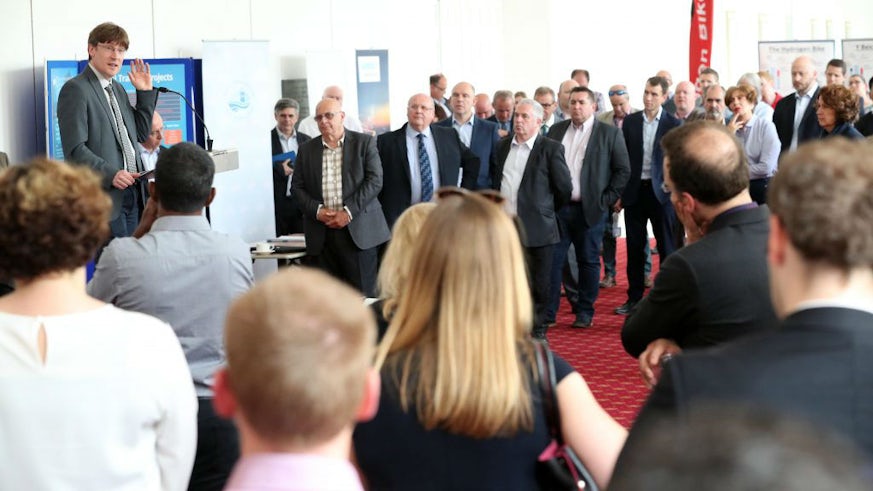FLEXIS supports leading ‘green’ council
25 June 2019

Chart-topping Neath Port Talbot Council is the best ‘green energy’ local authority in Wales.
Latest Welsh Government figures show the Council has the highest total renewable energy capacity and the greatest renewable energy generation across the country.
FLEXIS, led by Cardiff University, is supporting the Authority’s Decarbonisation and Renewable Energy Strategy by applying its research to a physical site in the county.
Professor Hywel Thomas, FLEXIS Principal Investigator said: “We are delighted to be working so closely with Neath Port Talbot Borough Council on a number of traction projects contributing to a low carbon smart future. Job creation, addressing fuel poverty and air quality are all outcomes fundamental to FLEXIS research.”
FLEXIS and Neath Port Talbot Borough Council unveiled a number of clean, green energy projects at a demonstration area launch event in May.
One of the flagship plans involves using hydrogen generated from excess electricity to fuel vehicles from Neath Port Talbot’s new £7m Swansea Bay Technology Centre in Baglan Bay Energy Park, while another centres on an area-wide air quality monitoring programme.
During the welcome address, Cllr Edward V Latham, Cabinet Member for Streetscene and Engineering at Neath Port Talbot Council said: “Neath Port Talbot Borough Council is delighted to have signed a Memorandum of Understanding (MoU) with the FLEXIS – a £24m programme research and innovation of energy systems technologies across Wales”.
The projects laid out in the MoU were outlined by Steven Phillips, Chief Operating Officer for Neath Port Talbot County Borough Council and include:
- Smart Low Carbon Town – Port Talbot (Smart Local Energy Systems)
- Electrical Grid Constraints
- Swansea Bay Technology Centre / University of South Wales Hydrogen Centre
- Low Emission Vehicles / Electrical Charging
- Cefn Coed Colliery Museum
- Mine Water Heat Recovery
- Real-time Energy Modelling
- Air Quality
Held at Margam Orangery, the event was opened by Prof Mark Taylor, Deputy Director Energy Innovation at the Department for Business, Energy and Industrial Strategy (BEIS).
FLEXIS has great potential for technologies which address climate change, particularly in the areas of industrial heat recovery and hydrogen.
FLEXIS researchers from Cardiff University, the University of South Wales and Swansea University are also working on or have proposed over 46 additional projects including: further development of low emission vehicles; using an energy data audit of the demonstration area to work out how to integrate, store and supply smart, clean energy; using ground-breaking ‘green-power’ system that uses ammonia to store and release zero-carbon energy; hydrogen and mine-water as heat for homes and communities; and working with industrial partners to de-risk the decarbonisation of heat.
The FLEXIS Social Science team are currently running ‘Energy Futures’ workshops with the Port Talbot community to explore how everyday life may change with a decarbonised energy system. Their findings will help FLEXIS demonstrator projects avoid risks and enhance the value to project stakeholders including the wider community.
Part-funded by the European Regional Development Fund through the Welsh Government, the vision of the five-year FLEXIS project is to achieve a resilient, affordable, secure energy system across Wales with the potential for global application.
Share this story
The School has world leading research, strong links with industry, and a friendly and supportive teaching environment make us one of the leading engineering schools in the UK.



